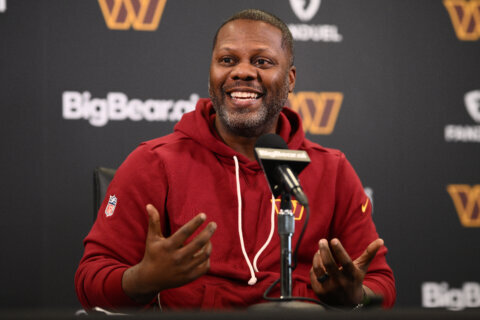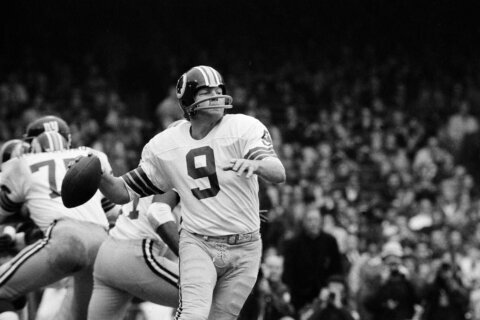As Commanders steady on field, business operations stumble originally appeared on NBC Sports Washington
The Washington Commanders lost a major partner last week when global beer company Anheuser-Busch InBev decided to pull out of its sponsorship deal.
That contract was worth at least $4 million annually, per NFL and team sources, and ranked among the Commanders’ four largest sponsorships. The only deals worth equal or more are with Pepsi, FedEx and Bank of America.
[Ed. Note – NBC Sports Washington has a business partnership with the Commanders.]
Losing the InBev sponsorship, which owns popular beer brands like Bud Light and Budweiser, comes on the heels of Washington losing its partnership with Medliminal, a health insurance adjustment company, last month. That smaller deal was worth only six-figures, a paltry sum compared to the exclusive beer sponsorship.
Walk around the Commanders’ home stadium FedEx Field and there are Bud and Bud Light logos plastered everywhere.
When Washington made the formal announcement in February that the team’s new name would be the Commanders, that announcement took place in an area of the stadium called the Bud Light Party Pavilion.
The move by the beer giant is puzzling given its presence throughout the NFL. InBev has sponsorship deals with 26 of the league’s 32 teams. The NFL did not respond about the move when asked for comment by NBC Sports Washington.
Washington Football Talk Podcast | Listen and Subscribe | Watch on YouTube
For many of those deals around the league, the beer sponsorship isn’t exclusive. Teams can and do secure sponsorship contracts with multiple beer companies.
In Washington, however, the deal was exclusive, and team and league sources said it was highly unusual that InBev would drop from an exclusive deal to no deal rather than simply lowering its financial commitment and moving to a non-exclusive contract.
The loss of the multi-million dollar sponsorship comes at a time of significant upheaval inside the Commanders business operations. Team and league sources explained that at least 20 non-football employees have left since the beginning of the year. Per one former team employee, “that place is a mess.”
The Commanders paint a different picture of the current atmosphere.
A team spokesperson said that even with the loss of revenue from the Anheuser-Busch deal, sponsorship revenues are on pace to outperform 2021. Of the employee turnover, the spokesperson allowed that it’s a time of “intense change” for the Commanders but that the end of the football season in January provided a natural turning point for staff transition.
Attendance remains a problem as empty seats have become the norm at FedEx Field over the last five years — and that was before Washington landed at the bottom of the NFL last season in tickets sold.
Sales are trending upward now, though, according to the spokesperson. The Commanders have sold more new season tickets in the last three weeks than in the previous three years, a sizeable achievement. But also keep in mind fans weren’t allowed to attend most games in 2020 due to the coronavirus pandemic.
There’s also the undeniable state of FedEx Field itself, which sustained a number of embarrassing mishaps including plumbing issues and a dangerous railing collapse.
Even during the mostly successful rollout of the team’s new name and logo last month, a Commanders crest displayed the wrong dates for the team’s three Super Bowl championships, which led to fan outrage. Eventually, the crest was corrected with the Commanders stating on social media: “We heard you loud and clear.”
That’s in addition to lingering NFL investigations into sexual harassment and workplace culture under Dan Snyder’s ownership.
A new headwind facing the organization emerged with the BoycottDan.com website, which provides email addresses for fans to reach out to team sponsors and encourage the companies to “sever any and all ties with Daniel Snyder and the Washington Commanders NFL team.”
Ironically, the Commanders football situation seems at its most stable in the last five years. Head coach Ron Rivera is firmly entrenched at the top of the organization’s football hierarchy and the team just traded for new quarterback Carson Wentz.A former MVP candidate, Wentz is hardly a sure thing after being dealt twice in two seasons by the Philadelphia Eagles and then the Indianapolis Colts, but he’s the best passer in Washington since Kirk Cousins departed via free agency after the 2017 season. Washington won seven games in each of Rivera’s first two seasons, and the coach made clear he expects more from his squad this fall.
While the Commanders’ name might be new, the arrival of a new quarterback and upheaval in business operations is not.
In 2018, Washington traded for veteran QB Alex Smith to replace Cousins and hired a crew of executives to overhaul and modernize its business operations.
Less than a year later all of those executives were gone and the team lost about 40 employees in the wake of their departure. Smith suffered a broken leg that fall and never returned to the same level of athleticism following the injury.
The Commanders’ new executive group does not believe the comparisons from 2018, and any previous efforts to revamp Washington’s organization, hold much current relevance.
“The biggest thing is we need to get out there and build trust with the community,” Washington team president Jason Wright said last month at an Economic Club forum. “For us, we need the humility to approach each conversation knowing we have to build trust. That it’s not just plainly there, that it needs to be earned or re-earned in places where that trust has faded.”
The effort to rebuild that trust, however, takes a hit when a major sponsor like Anheuser-Busch InBev decides it doesn’t want to continue a financial relationship with the Washington brand. The Commanders are actively looking for a new alcohol sponsor for 2022.
Speaking with league sources about Washington this offseason one message became clear – despite Rivera’s efforts to improve the team’s reputation, the Commanders are not a top destination for NFL talent. Washington was never in the running for elite quarterback options like Russell Wilson or Deshaun Watson.
It appears that may be the case for top NFL sponsors as well.






